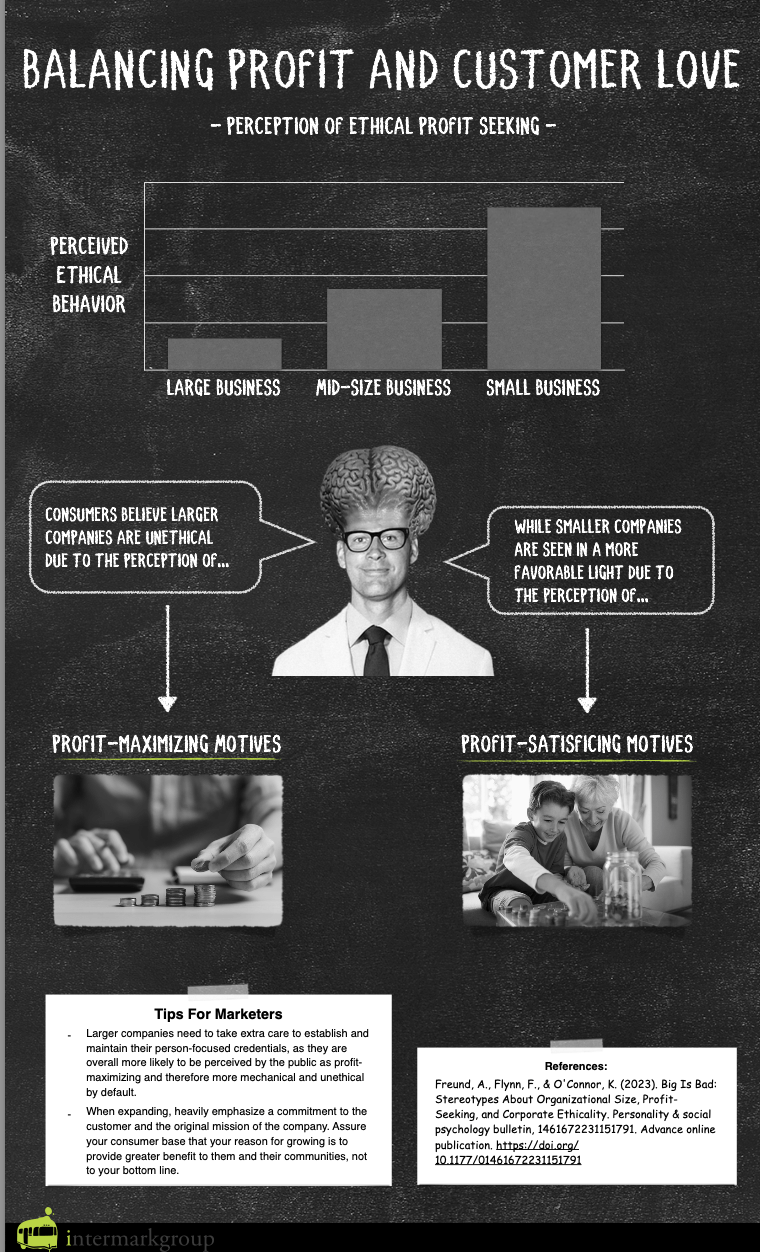By: Dr. James McFarland, People Scientist
Although an essential component to the overall success of market economies, profit-seeking is often viewed negatively within many social circles. In fact, for-profit businesses struggle to achieve even a small measure of the goodwill automatically garnered by their non-profit counterparts. For example, studies in psychology show that implying the proceeds of a purchase (in this case, cupcakes on a college campus) are going towards a local charity or a good cause will increase sales by approximately 33% (Levine, 2003). On average though, these same emotional triggers are often absent or difficult to legitimately establish for businesses whose primary concerns are turning a profit.
Consumers are aware of the subtle difference between needs and wants, especially when it comes to for-profit vs. non-profit entities. While rational minds may agree that profit-seeking is a necessary part of modern society, emotionally it falls more on the “want” side of the scale rather than the “need” side of the scale commonly associated with non-profit entities. This difference between needs and wants can be seen as a continuum between profit-satisficing vs. profit-maximizing. Whereas the former’s motive appears to be a function of necessity (e.g., providing a positive reciprocal relationship to the involved individuals), the latter’s motive suggests the desire for an excess beyond any specific needs (e.g., continual financial growth via the bottom line).

While for-profit entities may generally be portrayed in the unethical light of profit-maximizing, a recent paper out of the Personality and Social Psychology Bulletin suggests that this perception is not universal among consumers. Over a series of nine different studies, the researchers found that consumers’ perception of ethical profit-seeking significantly varied according to the size of the organization being evaluated. The research showed that individuals automatically stereotyped large companies as being less ethical than small companies. This size-ethicality stereotype emerged spontaneously and implicitly, suggesting that people hold these beliefs even when they are not consciously aware of them. Furthermore, these stereotypes were consistent across industries, indicating that people’s beliefs about the relationship between size and ethicality are not limited to specific industries.
Instead, the research findings revealed that it is the perception of the profit-seeking behavior itself that explains the size-ethicality stereotype. Participants attributed greater profit-maximizing motives to large companies. While in comparison, the motives of small companies were perceived to be profit-satisficing. Meaning that while the smaller companies were also perceived as seeking a profit, their motives for doing so (e.g., prioritizing employee and consumer experience) were viewed as being ethically acceptable by consumers.
Lessons for marketers:
- Larger companies need to take extra care to establish their person-focused credentials, as they are overall more likely to be perceived by the public as profit-maximizing and therefore more mechanical and unethical by default.
- Emphasize your brand’s commitment to the customer and the original mission of the company. Let consumers know that while the brand may be growing, its reason for existing is still to maintain and improve the positive reciprocal relationship between its employees and customer base, rather than maximizing its potential reach or footprint.
- Avoid actively engaging in profit-maximizing motives and behaviors (e.g., Rent-seeking, where companies expend resources to obtain profit without producing any direct benefits to its consumers in exchange). While there may be short-term gains inherent in such behaviors, consumers will be more distrustful in the long run and will be more likely to perceive the brand as unethical and only interested in profit for profit’s sake.
That’s it for this week! Join us next time for more psychology insights into the consumer mindset. And don’t forget to sign up for our next webinar, “How Tribal Psychology Drives Human Behavior,” on Tuesday, April 25th at 10:00 AM CDT! If you have any questions or want to learn more about using psychological principles to improve your marketing, give us a call (833-579-1905) or email us at [email protected].
References: Levine, R. (2003). The power of persuasion: How we’re bought and sold. Hoboken, NJ: John Wiley & Sons.